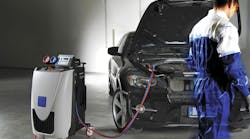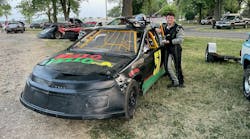The New Hampshire state legislature is taking a close look at the way appraisers and adjusters prepare damage estimates as they consider two bills introduced in January aimed at confronting the problem of underestimating insurance claims. Representative Marshall Quandt of Exeter, the sponsor of the two bills, proposed the legislation after receiving complaints from constituents about unusually low repair estimates they received from their insurance companies after a hail storm pummeled the region this past summer. Hundreds of vehicles were damaged in the storm. The first bill, HB 31, calls for any person acting as a physical property damage appraiser on behalf of an insurance company to be licensed by the insurance department. The second bill, HB 169, would enact penalties for insurance adjusters, appraisers or companies “purposefully underestimating the value of an insurance claim.” If passed, both bills would take effect in 2008. “In talking with auto body shops, I've heard that this problem is fairly rampant,” says Quandt, in an interview with ABRN. “If there are people in the industry who do this in Exeter, then I'm fairly certain it happens all over.” Consumer groups and members of the collision repair community have long suspected insurers of deliberately underwriting estimates for some time. According to Keith Volquardsen, a consultant with the National Alliance of Paintless Dent Repair Technicians (NAPDRT), adjusters will try to keep estimates as low as possible so that customers who opt to not have their vehicles repaired will receive only minimal payouts. “This is a nationwide problem,” says Volquardsen. “A large percentage of people never get their vehicles repaired. They take the money and pocket it. It's in the insurance companies' interest to write [the estimate] as low as they can, and then supplement the people who actually get the vehicles repaired. There is no incentive for them to make a good faith effort to estimate the vehicle correctly.” The NAPDRT is supporting the proposed legislation in New Hampshire, and the group's president, Jamie Hawkins, will testify at an upcoming hearing on HB 169. “The New Hampshire legislators looked into this, and realized there were no laws on the books to discourage insurance adjusters from intentionally writing an estimate that's really low,” Volquardsen says. “As long as an insurance adjuster operates within the parameters of his company policies, he is covered by the company,” says Quandt. “What happens when they don't? Maybe they don't follow the rules and regulations. My bill would hold them accountable.” Insurers, however, believe these issues are already covered sufficiently through existing consumer protection laws and the regulations of the New Hampshire Insurance Department “It is the view of my clients that appraisers are already responsible for their conduct, and that the insurance company bears the responsibility to be accountable to the public and to the insurance department,” says George Roussos, an attorney with Orr & Reno in Concord, N.H., who represents the New Hampshire Association of Domestic Insurance Companies. “If there is misconduct on the part of someone hired by the appraiser, then the company is on the hook. This bill is just another bureaucratic layer that is not necessary.” A few other states already license appraisers, including nearby Massachusetts. “I think it's definitely beneficial,” says Chuck Sulkala, owner of Acme Body & Paint in Jamaica Plain, Mass. “I have to have a license to write an estimate. If I don't do it properly, whether I work for the insurance company or the repairer, I'm the one that will be brought before the board. You have a degree of risk as an individual.” The issue of fraudulent estimates is more complex than the licensing bill. While insurance adjusters have been accused of keeping estimates low to benefit the insurance companies, repair shops also often miss the mark on initial estimates. A number of factors can lead to an incorrect estimate, including lack of experience on the part of the estimator, or hidden damage that's not readily apparent if the vehicle isn't torn down for the estimate. “The real problem is, the consumer doesn't know what was missed initially if they don't get the car repaired,” says Sulkala. “If they do get it repaired and see this huge disparity between the estimate and the final bill, that's going to raise some eyebrows, and it doesn't do any of us any good. There really needs to be a lot more effort made to look into this and come to some kind of resolution. The industry is really miles apart on this, depending on where you sit.” Even some people in the collision repair industry are unsure how effective a law like HB 169 will be. “There are plenty of laws on the books right now, all we need is enforcement,” says Tony Lombardozzi, owner of Automotive Collision Repair Services in Hudson, N.H., and president of the Coalition for Collision Repair Excellence (CCRE). “Fraud is fraud. When a consumer complains about their estimate, the attorney general should say, 'We have a problem here.' Right now, the attorney general turns around and hands it off to the department of insurance. If insurers are intentionally underwriting the value of a loss, that's consumer fraud. Any other fraud case would be handled by the attorney general.” HB 31 received a hearing on Jan. 24, and a hearing for HB 169 was scheduled for Jan. 30. If the two bills make it out of committee, they'll need to pass the New Hampshire House and Senate before becoming law. “I expect a tremendous amount of opposition,” says Quandt. “If you talk to the insurance industry, this problem doesn't exist.” Roussos says a possible compromise on the licensing issue could be reached that would be acceptable to insurers. “One possibility would be to only license so-called independent appraisers, or those not affiliated with or employed by an insurance company,” he says. As for the underwritten estimate issue, Roussos thinks any additional legislation would be redundant. “It would just prohibit what is clearly prohibited under the laws today,” he says. “It doesn't add any enforcement to what the insurance department already does.” Lombardozzi, on the other hand, thinks the bills skirt a larger issue: that insurers shouldn't have a hand in estimating at all. “The issues go deeper than these two bills,” he says. “Insurers do not repair cars. Why are we giving those estimates any credibility?” The NAPDRT is setting up an area on its Web site, www.napdrt.org, where consumers can obtain more information and file complaints. Volquardsen says the group will also be working closely with the Automotive Service Association (ASA) on estimating and insurance issues. |
Voice Your Opinion!
Voice Your Opinion!

